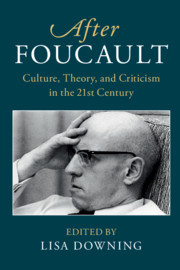Introduction
Published online by Cambridge University Press: 30 May 2018
Summary
I don't write a book so that it will be the final word; I write a book so that other books are possible, not necessarily written by me.
Michel Foucault, interview, 1971The work of an intellectual is not to mould the political will of others; it is, through the analyses that he does in his own field, to re-examine evidence and assumptions, to shake up habitual ways of working and thinking, to dissipate conventional familiarities, to re-evaluate rules and institutions and to participate in the formation of a political will.
Michel Foucault, interview, 1989Michel Foucault (1926–1984) considered himself a ‘historian of the present’. By this, he meant that he intended his archeological and genealogical studies of institutions and phenomena, such as psychiatry, prisons, and criminality, to reveal, via analysis of the past conditions that produced them, a truth about our enduring relationship with them in the present. Foucault first used the term ‘history of the present’ in Discipline and Punish (1975), where he rhetorically asks why he is motivated to carry out a historical analysis of the carceral system: ‘Simply because I am interested in the past? No, if one means by that writing a history of the past in terms of the present. Yes, if one means writing the history of the present’. Thus, a ‘history of the present’ is not anachronism, that is, the past viewed and distorted through the necessarily biased lens of the present; rather, as Foucault put it: ‘I set out from a problem expressed in the terms current today and I try to work out its genealogy. Genealogy means that I begin my analysis from a question posed in the present’.
Given Foucault's desire to write a history of the present, it bears asking in what ways, and to what extent, the concerns of his present speak, still today, to ours. The work of Foucault is much read, widely cited, and often misunderstood. In response to this state of affairs, this book aims to clarify, contextualize, and contribute to knowledge about Foucault in a very specific way.
- Type
- Chapter
- Information
- After FoucaultCulture, Theory, and Criticism in the 21st Century, pp. 1 - 14Publisher: Cambridge University PressPrint publication year: 2018

